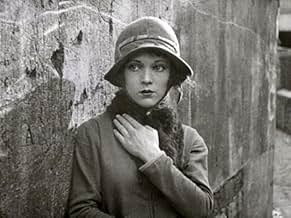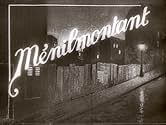Ménilmontant
- 1926
- 38 min
AVALIAÇÃO DA IMDb
7,8/10
2,9 mil
SUA AVALIAÇÃO
Adicionar um enredo no seu idiomaA couple is brutally murdered in the working-class district of Paris. Later on, the narrative follows the lives of their two daughters, both in love with a Parisian thug and leading them to ... Ler tudoA couple is brutally murdered in the working-class district of Paris. Later on, the narrative follows the lives of their two daughters, both in love with a Parisian thug and leading them to separate ways.A couple is brutally murdered in the working-class district of Paris. Later on, the narrative follows the lives of their two daughters, both in love with a Parisian thug and leading them to separate ways.
- Direção
- Roteirista
- Artistas
Avaliações em destaque
There is an old German proverb that says that size doesn't matter ( well, size does count for this count having in mind the perimeter of his Teutonic heiresses
) and the saying rings true with "Ménilmontant" a medium-length silent film directed by Herr Dimitri Kirsanoff, and a striking, disturbing masterpiece.
Herr Kirsanoff's direction is astonishing in every aspect of the film, particularly in its technique. It's a mixture of drama, avant-garde, experimental film and hyper realism. The story depicted in the film ( the terrible life of two orphan sisters ) doesn't allow any concession to the audience; to watch "Ménilmontant" today still invokes amazement, distress and an infinite sadness.
From the very start of the film ( superb, striking and masterful editing by Herr Kirsanoff himself ) the director shows power and imagination and a strong control of film narrative ( there is no need of intertitles ). Kiransoff's use of imagery is thrilling and brilliant. Images emphasize a ruined happy childhood and the duality and dangers of a big city ( flashbacks, imaginative camera angles, dreamy and poetic shots ) not to mention the sorrowful life of the two orphans, an existence of loneliness, abandonment and despair that broke the heart of a heartless German aristocrat, especially the superb scene in which the younger sister ( touching Dame Nadia Sibirskaia ) ,alone and hungry on a bench park with her baby, accepts some bread from an old man, a moving and lyrical scene, that summarizes the spirit and achievement of this oeuvre.
"Ménilmontant" is a work of art, a striking experimental style in the service of a tragic and sad story, brilliantly and disturbingly balanced.
And now, if you'll allow me, I must temporarily take my leave because this German Count must become a little livelier.
Herr Graf Ferdinand Von Galitzien http://ferdinandvongalitzien.blogspot.com/
Herr Kirsanoff's direction is astonishing in every aspect of the film, particularly in its technique. It's a mixture of drama, avant-garde, experimental film and hyper realism. The story depicted in the film ( the terrible life of two orphan sisters ) doesn't allow any concession to the audience; to watch "Ménilmontant" today still invokes amazement, distress and an infinite sadness.
From the very start of the film ( superb, striking and masterful editing by Herr Kirsanoff himself ) the director shows power and imagination and a strong control of film narrative ( there is no need of intertitles ). Kiransoff's use of imagery is thrilling and brilliant. Images emphasize a ruined happy childhood and the duality and dangers of a big city ( flashbacks, imaginative camera angles, dreamy and poetic shots ) not to mention the sorrowful life of the two orphans, an existence of loneliness, abandonment and despair that broke the heart of a heartless German aristocrat, especially the superb scene in which the younger sister ( touching Dame Nadia Sibirskaia ) ,alone and hungry on a bench park with her baby, accepts some bread from an old man, a moving and lyrical scene, that summarizes the spirit and achievement of this oeuvre.
"Ménilmontant" is a work of art, a striking experimental style in the service of a tragic and sad story, brilliantly and disturbingly balanced.
And now, if you'll allow me, I must temporarily take my leave because this German Count must become a little livelier.
Herr Graf Ferdinand Von Galitzien http://ferdinandvongalitzien.blogspot.com/
Watched Dimitri Kirsanoff's Ménilmontant last night. It's right out of the top drawer. Filmed in 1926 when the rubric for making a film was not yet set, the rules not there to be broken. You can sense the sheer vitality that the filmmaker is enabled with because of this. It feels like a Zola novel, a great portrait of urban life, and also a valuable document of the way Paris looked at the time. Kirsanoff is not weighed down by cinematic antecedents, there are no Hitchockian homages, no cinematic in-jokes, no nods to popular culture, no product placement. This makes the film alive with atmosphere, almost overflowing with it. Somehow Mr Kirsanoff places you in the film, makes you an insider to the innocence of childhood, the loneliness of the big city, the despair of poverty, the shock of betrayal.
His camera is like the Kino-Eye, and it looks at things the way real people look at them, making it the least phallic use of a camera that I have seen. The shots of the Seine, of the countryside, of Ménilmontant, and the roving, lingering, pace of the camera were quite literally breath-taking. There are no intertitles in this silent movie, and the plot is a little opaque, but really this is not taking the movie on its own terms, it is a masterpiece of camera-work and editing and provides the most atmosphere of any movie I have ever seen. It is ESSENTIAL to watch this movie at its 38 minute pace. I saw it on the double-disc Kino edition of Avant-garde: Experimental Cinema of the 1920s and 30s. This is the best value for money DVD on the market full stop.
Recently I watched Lang's The Testament of Dr Mabuse and became aware through his virtuosic use of sound, how taken for granted sound is in movies these days. Watching Ménilmontant makes you realise how taken for granted image is, most of modern cinema is simply about dubious storytelling to quote something I heard on TV, " it's a cultural wasteland filled with inappropriate metaphors and an unrealistic portrayal of life created by the liberal media elite". I recommend this movie to all lovers of cinema, it really is a movie that can make you once again enthuse about the moving image.
His camera is like the Kino-Eye, and it looks at things the way real people look at them, making it the least phallic use of a camera that I have seen. The shots of the Seine, of the countryside, of Ménilmontant, and the roving, lingering, pace of the camera were quite literally breath-taking. There are no intertitles in this silent movie, and the plot is a little opaque, but really this is not taking the movie on its own terms, it is a masterpiece of camera-work and editing and provides the most atmosphere of any movie I have ever seen. It is ESSENTIAL to watch this movie at its 38 minute pace. I saw it on the double-disc Kino edition of Avant-garde: Experimental Cinema of the 1920s and 30s. This is the best value for money DVD on the market full stop.
Recently I watched Lang's The Testament of Dr Mabuse and became aware through his virtuosic use of sound, how taken for granted sound is in movies these days. Watching Ménilmontant makes you realise how taken for granted image is, most of modern cinema is simply about dubious storytelling to quote something I heard on TV, " it's a cultural wasteland filled with inappropriate metaphors and an unrealistic portrayal of life created by the liberal media elite". I recommend this movie to all lovers of cinema, it really is a movie that can make you once again enthuse about the moving image.
Dmitri Kirsinov's Menilmontant is considered to be a landmark in the art of film-making. The story is sparse, melodramatic, and brief. The film is barely twenty minutes long. A young girl leaves home after a somewhat vague hatchet murder takes place. She spends time in the seedy streets of Menilmontant, a medieval suburb of Paris. She drifts through a relationship with her sister and man friend.
If you are looking for a strong story and character development, you may be missing the point. Kirsanov was trying to manipulate images in such a way as to get a reaction from his viewer. The bigger story is just a convention on which to hang his moody images. The axe murder with its choppy editing is a very early use of this sort of emotive technique. You are one moment under the flailing axe, interleaved with fast cuts of a howling victim. Later in the film the younger sister is the center of a blurry sensual reverie, her body and her grim surroundings in and out of focus. Silent film as art needs to be taken on its own terms. Kirsanov and other early filmmakers helped to define the way we view, and how we understand the film narrative. That understanding of how the film story works was established quite some time ago, which needs remembering by those of us not around in 1926. It was not foreordained that fast editing, double exposure and other techniques would come into their own. Someone had to prove the power of a restrained use of these formal ideas. Kirsanov did this in 1926.
If you are looking for a strong story and character development, you may be missing the point. Kirsanov was trying to manipulate images in such a way as to get a reaction from his viewer. The bigger story is just a convention on which to hang his moody images. The axe murder with its choppy editing is a very early use of this sort of emotive technique. You are one moment under the flailing axe, interleaved with fast cuts of a howling victim. Later in the film the younger sister is the center of a blurry sensual reverie, her body and her grim surroundings in and out of focus. Silent film as art needs to be taken on its own terms. Kirsanov and other early filmmakers helped to define the way we view, and how we understand the film narrative. That understanding of how the film story works was established quite some time ago, which needs remembering by those of us not around in 1926. It was not foreordained that fast editing, double exposure and other techniques would come into their own. Someone had to prove the power of a restrained use of these formal ideas. Kirsanov did this in 1926.
Menilmontant (1926) was, in the modest context of the alternative cinema circuit, a smash hit. It's great success allowed filmmaker Dimitri Kirsanov to go on making films, and also helped Jean Tedesco to stay in business as an exhibitor.
Like Kirsanov's first film, Menilmontant (again starring Kirsanoff's first wife, the beautiful Nadia Sibirskaia) tells a story without the use of inter-titles. It is often said that the filmmakers cinema is poetic, but one must add that in his second film he explored the poetics of violence and degradation.
The story begins and ends with two unrelated, but similarly filmed and edited murders. In each case, the grisly event does not grow organically out of the plot, but seems to surge out of a world welling with violent impulses.
Menilmontant uses practically all of the typical stylistic devices of cinematic impressionism, but it is hard to consider it as in any way representative of the movement. It's overwhelming, virtually unrelieved violence and despair seem to infect its own storytelling agency, upsetting what in other filmmakers' works would be clearly delineated relations of parts to the whole.
The film contains several bursts of rapid editing, for example, but they are not rhythmic in any simple, narratively justified way (in the manner of Abel Gance, for example); their meter is complicated and unsettling, worthy of an Igor Stravinsky. The film offers several notable examples of subjective camera work, but typically these become slightly unhinged, with no absolute certainty as to which character's experience in being rendered.
Menilmontant is, quite deliberately, a film in which the formal center cannot hold, because it is about a world in which this is also true. Although certainly not a Surrealist work, it shares with Surrealism no only a fascination with violence and sexuality, but also a display of forces and transcend, and question the boundaries of, individual human consciousness.
Kirsanov concluded his Menilmontant with a shot of impoverished and exploited young women fashioning artificial flowers in the poorest district of Paris, he provided us the most comprehensive image, aesthetic and social, of this form of cinema. Through a panoply of stylistic experiments and through glorious close-ups of the incomparably fragile face of Sibirskaia, Kirsanov thought he had shaped a harsh milieu into an exquisite flower. But a flower for whom? Menilmontant would become a major film on the cine-club and specialized cinema circuit, but never played to the people of the working class quatier that gave it its title. This was not Kirsanov's public anyway, for he came from the Russian aristocracy. In 1919, having fled the Revolution, he was reduced to playing his beloved cello in movie houses just to be able to eat. He must have been tempted to imagine himself and his music as an unappreciated flower in the crude milieu of mass art.
Seen this way, Menilmontant becomes a personal triumph of art over industry, of the icon of Sibirskaia over the brutal world of plot and spectacle that constitutes ordinary cinema. That triumph is signaled in the miracle of the film's narration, the first French film without titles, a tale told completely through the eloquence of its images. The dark alleys of the nineteenth arrondissment, the streetlights listening on the Seine, and the pathetic decor of shabby apartments are all redeemed by art. No silent film more clearly bewails the fate of art in our century, more obviously appeals to connoisseurs of the emotions roused by artificial flowers.
Like Kirsanov's first film, Menilmontant (again starring Kirsanoff's first wife, the beautiful Nadia Sibirskaia) tells a story without the use of inter-titles. It is often said that the filmmakers cinema is poetic, but one must add that in his second film he explored the poetics of violence and degradation.
The story begins and ends with two unrelated, but similarly filmed and edited murders. In each case, the grisly event does not grow organically out of the plot, but seems to surge out of a world welling with violent impulses.
Menilmontant uses practically all of the typical stylistic devices of cinematic impressionism, but it is hard to consider it as in any way representative of the movement. It's overwhelming, virtually unrelieved violence and despair seem to infect its own storytelling agency, upsetting what in other filmmakers' works would be clearly delineated relations of parts to the whole.
The film contains several bursts of rapid editing, for example, but they are not rhythmic in any simple, narratively justified way (in the manner of Abel Gance, for example); their meter is complicated and unsettling, worthy of an Igor Stravinsky. The film offers several notable examples of subjective camera work, but typically these become slightly unhinged, with no absolute certainty as to which character's experience in being rendered.
Menilmontant is, quite deliberately, a film in which the formal center cannot hold, because it is about a world in which this is also true. Although certainly not a Surrealist work, it shares with Surrealism no only a fascination with violence and sexuality, but also a display of forces and transcend, and question the boundaries of, individual human consciousness.
Kirsanov concluded his Menilmontant with a shot of impoverished and exploited young women fashioning artificial flowers in the poorest district of Paris, he provided us the most comprehensive image, aesthetic and social, of this form of cinema. Through a panoply of stylistic experiments and through glorious close-ups of the incomparably fragile face of Sibirskaia, Kirsanov thought he had shaped a harsh milieu into an exquisite flower. But a flower for whom? Menilmontant would become a major film on the cine-club and specialized cinema circuit, but never played to the people of the working class quatier that gave it its title. This was not Kirsanov's public anyway, for he came from the Russian aristocracy. In 1919, having fled the Revolution, he was reduced to playing his beloved cello in movie houses just to be able to eat. He must have been tempted to imagine himself and his music as an unappreciated flower in the crude milieu of mass art.
Seen this way, Menilmontant becomes a personal triumph of art over industry, of the icon of Sibirskaia over the brutal world of plot and spectacle that constitutes ordinary cinema. That triumph is signaled in the miracle of the film's narration, the first French film without titles, a tale told completely through the eloquence of its images. The dark alleys of the nineteenth arrondissment, the streetlights listening on the Seine, and the pathetic decor of shabby apartments are all redeemed by art. No silent film more clearly bewails the fate of art in our century, more obviously appeals to connoisseurs of the emotions roused by artificial flowers.
The Ménilmontant depicted here by Dimitri Kirsanofff is a far cry from the picturesque village of Charles Trenet's famous chanson. The grim and narrow cobbled streets provide a backdrop for a film of which the subject matter is that of conventional melodrama but which has been raised by Dimitri Kirsanoff to the level of cinematic art.
The stylistic effects he employs are those of Impressionism, notably rapid montage, superimposition and flashbacks but never at the expense of the narrative and nigh-on a century later the film's emotive power has not diminished and remains a devastating piece of social realism which concerns two orphaned sisters who are eventually reconciled, having been betrayed by the same man.
Suffice to say the lynchpin is the director's wife and muse Nadia Sibirskaia whose face is adored by the camera and whose performance as the younger sister is stunning in its simplicity.
The mood of the film is heightened by the newly composed score of the talented Paul Mercer.
This is the second and indeed oldest surviving film of Russian émigré Kirsanoff and although to my knowledge he never again reached such heights this piece of ciné poetry guarantees his immortality.
The stylistic effects he employs are those of Impressionism, notably rapid montage, superimposition and flashbacks but never at the expense of the narrative and nigh-on a century later the film's emotive power has not diminished and remains a devastating piece of social realism which concerns two orphaned sisters who are eventually reconciled, having been betrayed by the same man.
Suffice to say the lynchpin is the director's wife and muse Nadia Sibirskaia whose face is adored by the camera and whose performance as the younger sister is stunning in its simplicity.
The mood of the film is heightened by the newly composed score of the talented Paul Mercer.
This is the second and indeed oldest surviving film of Russian émigré Kirsanoff and although to my knowledge he never again reached such heights this piece of ciné poetry guarantees his immortality.
Você sabia?
- CuriosidadesPauline Kael said this was her favorite film of all time.
- Versões alternativasThis film was published in Italy in an DVD anthology entitled "Avanguardia: Cinema sperimentale degli anni '20 e '30", distributed by DNA Srl. The film has been re-edited with the contribution of the film history scholar Riccardo Cusin . This version is also available in streaming on some platforms.
- ConexõesEdited into The language of the silent cinema 1895-1929 - Part II: 1926-1929 (1973)
Principais escolhas
Faça login para avaliar e ver a lista de recomendações personalizadas
Detalhes
- Tempo de duração
- 38 min
- Cor
- Mixagem de som
- Proporção
- 1.33 : 1
Contribua para esta página
Sugerir uma alteração ou adicionar conteúdo ausente

















